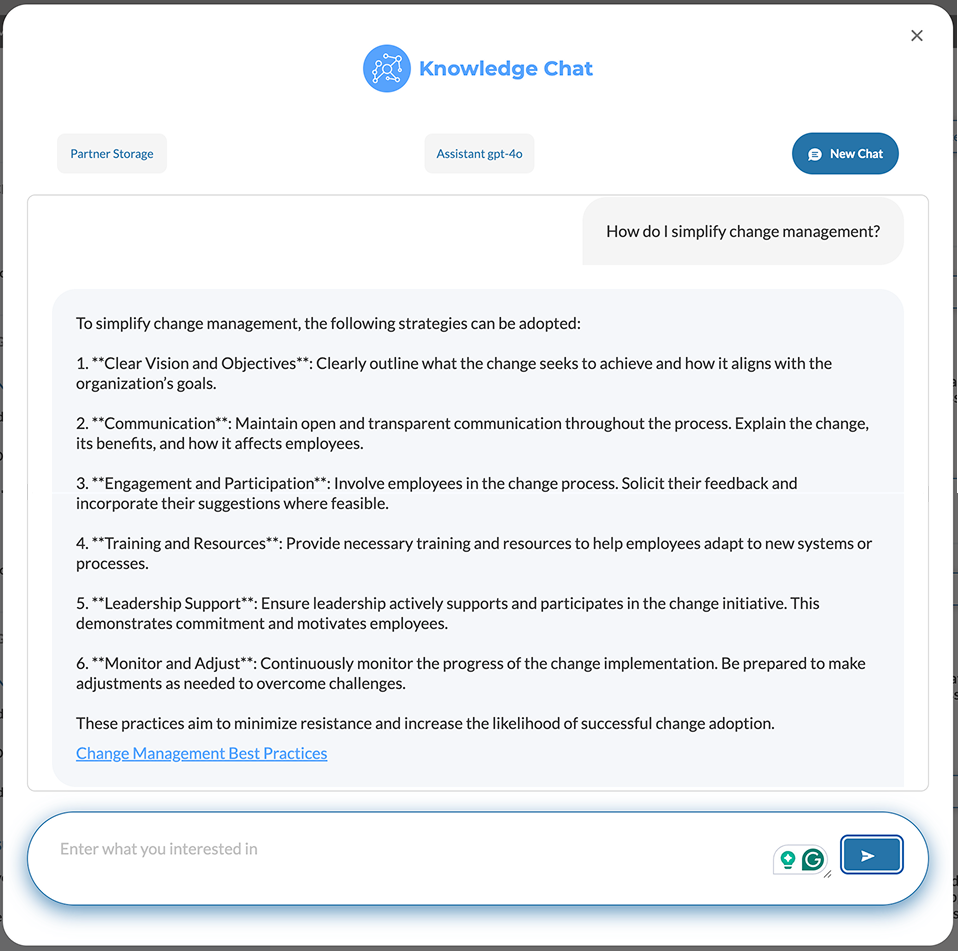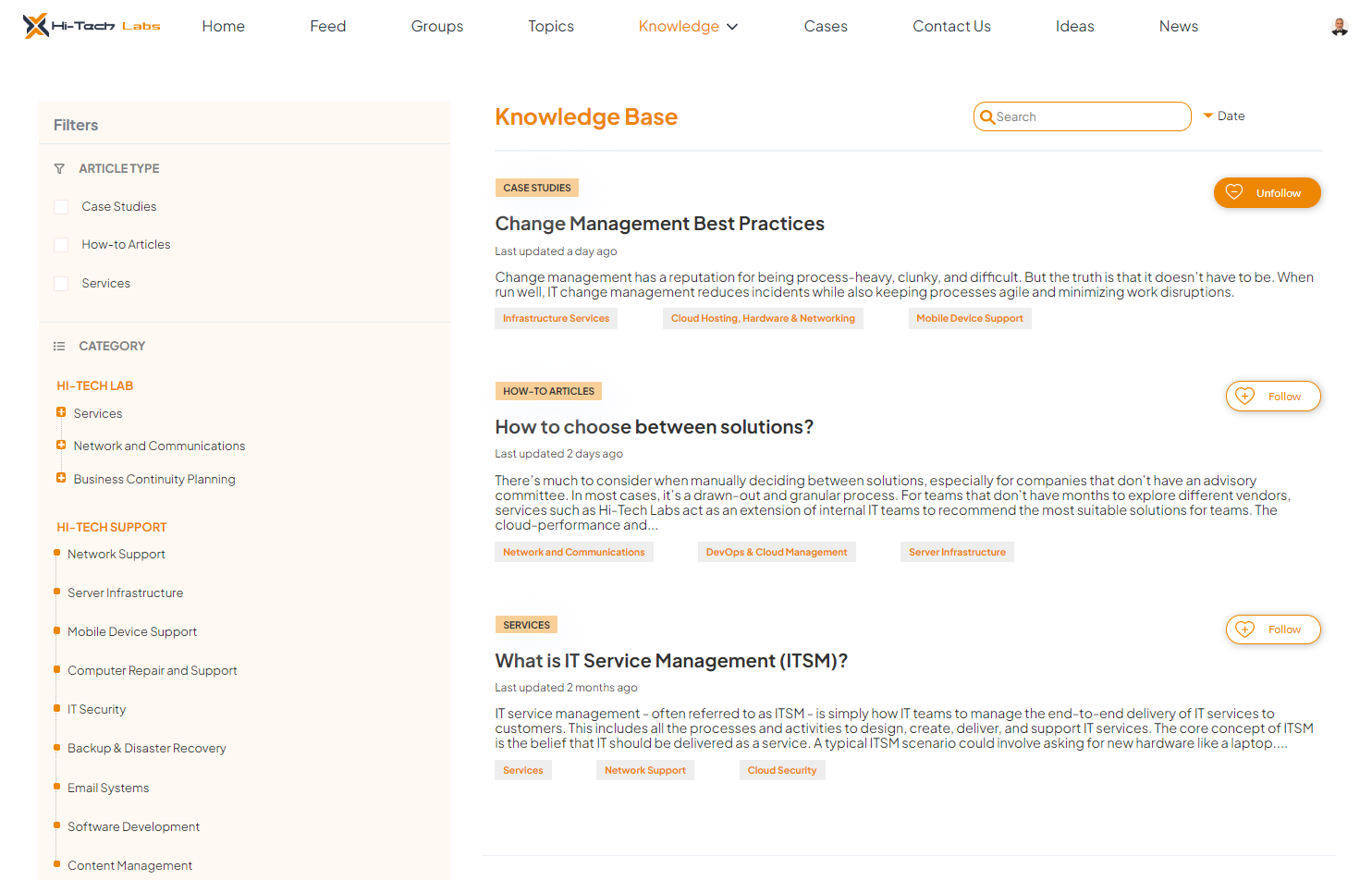What is Case Management in Salesforce — and How a Smart Knowledge Base Supercharges It
Every day, service teams across industries are asked to solve complex, urgent client issues—yet many still rely on outdated tools, siloed communication, and scattered support systems. The result? Slower response times, inconsistent service delivery, and increased strain on already overburdened case managers.
So, what is case management—and how can Salesforce, paired with smarter tools, revolutionize it?
Case management services are about more than tracking client interactions—it’s about delivering the right support, at the right time, through a seamless, coordinated process. When enhanced with intelligent solutions, this process becomes faster, more efficient, and more impactful.
That’s where AC Knowledge Management Enterprise comes in. This powerful, native Salesforce app embeds smart, context-aware knowledge directly into the Salesforce Experience Cloud, giving case managers the insights they need to act quickly and confidently.
In this blog, we’ll explore what case management really means, outline the case management process in Salesforce, and show how AC’s cutting-edge solution enables cost-effective outcomes through automation, collaboration, and accessible knowledge at every step.
What is Case Management? A Multi-Industry View
At its core, case management is a collaborative process that helps individuals access and navigate services efficiently, ensuring their needs are met with the right level of support. The practice spans industries, each with its own focus and challenges.
- Clinical Case Management in healthcare and behavioral health connects patients to medical, therapeutic, and community-based services to improve long-term health outcomes.
- Legal Case Management supports law firms in tracking client interactions, managing documents, and ensuring regulatory compliance throughout each case.
- Human and Social Services use case management to coordinate benefits, resources, and programs for families and individuals facing financial or social hardships.
In every instance, the case manager plays a critical role—identifying client needs, coordinating with community resources, and aligning with appropriate service providers to improve an individual’s or family’s health, safety, or legal standing.
By streamlining case management service delivery through this collaborative process, organizations can improve both outcomes and operational efficiency.
Understanding the Case Management Process in Salesforce
Salesforce is a powerful platform for organizations seeking to modernize their case management process. Here’s a step-by-step look at how Salesforce Experience Cloud supports a full case lifecycle:
- Data Collection and Risk Evaluation: Intake forms, automated surveys, and CRM data help case managers quickly assess the urgency and complexity of a case.
- Planning Stage and Service Planning: With insights in hand, case managers develop tailored plans aligned with client needs and available services.
- Providing Services and Coordinating with Providers: Direct collaboration through Salesforce community portals, automated tasks, and integrated communication tools.
- Monitoring and Measuring Desired Outcomes: Dashboards and analytics track progress and outcomes, enabling real-time adjustments and transparent reporting for case managers.
Salesforce Experience Cloud also supports direct visibility across all parties involved, enhancing communication and enabling a streamlined delivery of services.
When integrated with case management software, Salesforce automates routine tasks, reduces delays, and allows case managers to focus on what matters—delivering support in a cost-effective manner that meets client needs.
Why Traditional Case Management Falls Short
Traditional case management systems often fall behind when it comes to handling the evolving demands of modern service delivery. Legacy tools typically suffer from fragmented communication, making it difficult for departments and partners to stay aligned. Without a unified platform, vital updates and insights are lost in disconnected email threads or outdated spreadsheets, causing delays in decision-making and reducing overall efficiency.
Manual data entry remains a persistent challenge, introducing errors and consuming valuable time that case managers could otherwise spend working directly with clients. As a result, the allocation of service resources becomes inefficient, with teams often duplicating efforts or overlooking available support options.
Another major issue lies in the inability to consistently assess a client’s functional capabilities or coordinate interactions across multiple stakeholders involved in a single case. This lack of cohesion not only slows progress but also risks overlooking critical details that could affect outcomes.
Perhaps most importantly, when knowledge is scattered across departments or locked in individual systems, case managers struggle to identify and utilize the most relevant community resources. The absence of a centralized, accessible knowledge base severely limits the ability to deliver timely, informed support, especially in complex or multi-faceted cases.
As case complexity increases, these inefficiencies compound, making it nearly impossible to achieve effective, scalable outcomes without the right technology to support collaboration, insight-sharing, and streamlined operations for case managers.
Meet AC Knowledge Management Enterprise: The Smartest Knowledge Solution for Salesforce
The AC Knowledge Management Enterprise app is a native Salesforce solution designed to bring intelligent, structured knowledge delivery into the heart of the Salesforce Experience Cloud, supercharging your case management system.
Key Capabilities:
- An AI-powered answer assistant, thanks to the integration with OpenAI, provides relevant answers based on the content of your knowledge base, including links to the appropriate sources

- Enhanced article sorting logic allows sorted articles to appear at the top of the page, making it easier to find relevant content and simplifying knowledge and case management.
- Case deflection statistics records and saves case deflection Salesforce statistics, including visits to the cases page, viewed articles, and created or deflected cases, so that you can easily track and analyze your performance
AC Knowledge Management Enterprise 3.1: Smarter Than Ever with OpenAI Integration

For professional case managers, the benefits of AC Knowledge Management Enterprise are immediately tangible. It dramatically reduces the time spent searching for documentation by surfacing the most relevant content right when it’s needed. This efficiency allows case managers to stay focused on client needs rather than administrative tasks. It also streamlines coordination with appropriate services, making it easier to align clients with the right resources quickly. Additionally, the platform enhances communication by ensuring that everyone involved—clients, partners, and internal teams—has access to consistent, accurate information throughout the lifecycle of a case.
Whether you’re managing complex legal, clinical, or social service cases, AC’s knowledge solution enables scalable, effective, and informed decision-making.
How AC Knowledge Management Supercharges Case Management
When a client enters your system with multifaceted needs—whether legal, housing, or healthcare-related—responding quickly and effectively requires more than just case notes and contact logs. AC Knowledge Management Enterprise transforms that experience by making the entire process smarter, more accessible, and more collaborative.
From the very beginning of a case, the platform automatically surfaces knowledge suggestions aligned with the specific planning stage and case type, helping case managers take immediate, informed action. Clients, in turn, benefit from a responsive self-service experience, where relevant content is filtered and delivered through intuitive interfaces powered by structured data categories. These categories function as dynamic filters—by article type, group, or even custom values—making it easy for users and staff alike to navigate large volumes of content without friction.

Collaboration is enhanced through a unified, always-updated knowledge base that serves as the single source of truth for everyone involved. Site users can actively contribute by creating draft articles directly from the Experience Cloud portal, ensuring the knowledge base evolves with input from those on the front lines. Subscriptions and a flexible rating system, including thumbs-up/thumbs-down and five-star options, provide feedback loops that help teams evaluate and refine their content continuously.
AC’s enhanced article views improve usability with collapsible content, anchor links, and personalized notifications, making it easier for users to stay engaged and informed. Its multibase support enables organizations to manage distinct product or service lines within a single environment, while advanced filtering options—ranging from quick searches to in-depth navigation—support both casual inquiries and deep research.
Best Practices for Case Management
Implementing a successful case management strategy in Salesforce goes beyond deploying software—it requires thoughtful planning, meaningful content structure, and user adoption. Below are best practices, supported by real-world examples, to help your organization elevate its approach to case management using Salesforce and AC Knowledge Management Enterprise.
Align Knowledge Categories with Case Management Models
To streamline access to information, your knowledge base should mirror the structure of your services. For example, a healthcare organization managing both mental health and primary care cases can use hierarchical data categories to organize content by service type, diagnosis, or care plan phase. This enables care coordinators to filter articles relevant to behavioral health clients without sifting through unrelated content.
By structuring knowledge around your specific case management model—whether clinical, legal, or social—you make it easier for case managers to retrieve exactly what they need, reducing delays in service delivery.
Automate Knowledge Surfacing Based on Case Context
Smart automation can greatly enhance how and when knowledge is delivered. Imagine a legal aid organization where a new case is logged under “eviction prevention.” With proper configuration, Salesforce can automatically surface knowledge articles related to tenant rights, emergency housing programs, and legal form templates—all based on the case’s type and status.
This approach ensures that knowledge is contextual, proactive, and embedded within the workflow, allowing case managers to act swiftly and accurately.
Empower Case Managers Through Training and Workflow Integration
Even the best tools are only as effective as their users. Equipping your team with targeted training ensures every case manager possesses the skills to work confidently with knowledge tools. A nonprofit serving refugees, for example, may train staff to contribute field learnings back into the knowledge base, improving accuracy and ensuring future cases benefit from lived experience.
Embedding knowledge workflows into everyday tasks turns information access into a habit, not a chore.
Use Analytics to Identify Gaps and Optimize Service Planning
Data insights can transform how you evolve your knowledge base. In one public agency, regular analysis revealed that articles about food assistance were frequently searched, but rarely rated as helpful. This prompted the agency to rewrite outdated articles and add multilingual resources, significantly improving satisfaction scores.
Monitoring usage, ratings, and feedback allows your organization to continuously refine knowledge content and enhance planning for future service needs.
By aligning your tools with thoughtful practices—structured content, automated delivery, engaged users, and data-informed improvements—you can elevate the impact of every case manager and provide faster, more informed, and consistent support.
Conclusion
Modern case management practices require more than just data capture—they require real-time, actionable, and context-aware knowledge.
The combination of Salesforce and AC Knowledge Management Enterprise offers the ideal solution to enhance the entire process, delivering outcomes that are faster, more personal, and significantly more cost-effective. Contact us today and learn how this combination can help you unlock smarter, scalable service delivery.
FAQ
What is the meaning of case management?
Case management is a collaborative process that involves assessing, planning, coordinating, and monitoring the services required to meet an individual’s health, legal, or social needs. It ensures that clients receive appropriate services from the right providers in a cost-effective manner, often across complex systems like healthcare, legal aid, or human services. In platforms like Salesforce, case management software helps automate and streamline this entire process for better outcomes.
What is the role of a case manager?
A case manager is responsible for guiding clients through service systems, from intake to resolution. They oversee the case management process, including data collection, risk evaluation, service planning, and outcome monitoring. A successful case manager possesses strong organizational, communication, and problem-solving skills and works closely with all parties involved to ensure that clients receive timely, effective, and coordinated care or support.
What is the difference between a social worker and a case manager?
While there is overlap, the roles have distinct focuses:
A social worker typically provides emotional support, advocacy, and therapeutic interventions. They are often licensed professionals trained in counseling and psychosocial assessment.
A case manager, on the other hand, focuses more on navigating support systems to connect individuals with the right service resources. Their work involves coordinating appropriate services, managing care plans, and ensuring desired outcomes are achieved efficiently.





